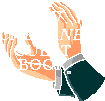HEAVEN ON EARTH AVIAN ACRES by Cherane Pefley
| 

Those who insist they can feed these babies to save dollars are putting the baby Hyacinthine Macaws in a high risk of death from starvation, bacteria or etc. when bought or sold unweaned to a inexperienced Aviculturist, Handfeeder/persons.
THE INTERNET IS NOT THE PLACE TO LEARN TO FEED A BABY BIRD..
Nuts, seeds and beans contain more protein than most other foods; (I'm studying Soy seed at this time) Macadamia, coconut are higher in calories from fat. Banana, papaya , apple, mango are carbohydrates or better known as simplex carbs. Vegetables which are orange and yellow in color as sweet potatoes, carrots,yam, pumpkin, mango, peaches and cantaloupe tend to contain higher amounts of carotene that is converted to Vitamin A. Potatoes, pasta,yams, beans are Complex Carbs.(longer duration of energy)
Kale, broccoli, turnip greens,chard tops and collard greens are great sources of calcium and chlorophyll also trace minerals and nutrients.
Fat is the lightweight form of energy storage however, too much will weigh a bird down. Amazing how many think a heavier bird is a better bird! The theory of a Fat deficiency in captive birds is usually only associated with disease is not accurate .. Body fat (how much does the bird weigh) is acceptable and common in our bird community. Fat or the heavier bird leads to obesity and can ultimately predispose a bird to fatty liver disease or lipoma fatty tumor/growth.
Fat is eliminated by metabolism ( exercising ) and we clip their feathers from their wings, thus, how is the bird to metabolize the fat elimination process?
Low protein, high lipoprotiens, high carbs both simplex (papaya,most fruits) and complex (cereals, grains,corn,, potatoes and pasta, etc.)
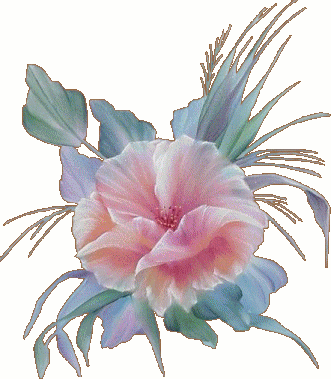


In the Rodeo Drive Scientific Bird Farm, in Rio de Janeiro, success has been achieved in the reproduction of a couple of Hyacinthine Macaw (Anodorhynchus hyacinthinus) fed on commercial pellet food and living in a bird cage from 3m long x 1.8m wide x 1.8m high. Three layings of three eggs each were observed in a period of 12 months, with 100% of fertility. Out of a total of nine eggs, eight hatched and six young birds survived, although one of the embryos died in the second week of incubation with the parents. One of the eggs was artificially incubated at 37.4° C and 50% of relative humidity with a loss of humidity up to the pip of 9.1% in 30 days of incubation. As for the naturally incubated eggs, the average period of incubation was of 28 days and the interval between the eggs of the same egging was of three to four days, being the highest reproductive period registered in the month of October.

The mash was digested without problem from the first to the last day, but papaya was added from the fourth week.. Unfortunately the bill again began to grow crooked from the fifth week. As one can only speculate about the fat content a Hyacinthine Macaw requires in the growth period, I added crushed macadamia nuts (73.7% fat) to the mash. Within 4 weeks the bill had corrected itself considerably and by the end of the hand-rearing period was no longer noticeable. This could be observed on several occasions with hand-reared young from the eighth week and be corrected (also with Ara ambigua).

Commercial Vitamixer is a must.
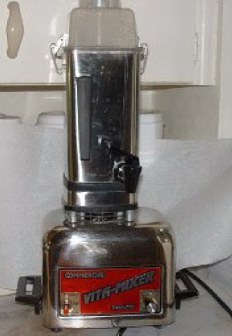
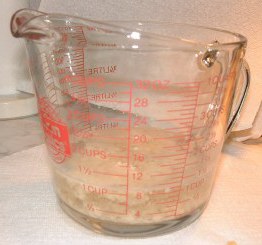
Good Weight Sale: Mixture Nutmilk
Macadamia & Nut Milk Ingredients(talk to a dietician or nutritionist) bulkfood.com or local stores
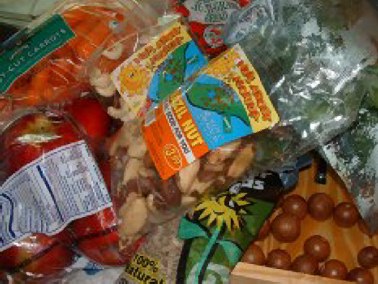 cc's
cc's Ground Foods/grains Raw Sunflower seeds
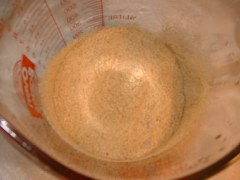
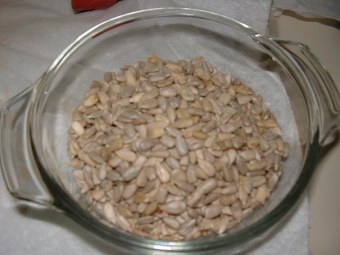
DRY FORMULA
WHEN FRESH IS NOT AVAILABLE
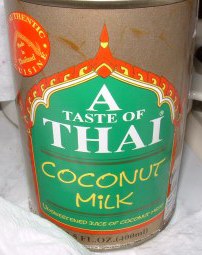
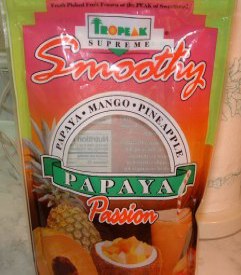
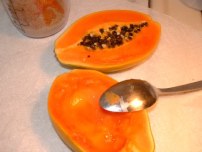
Apples-Beets-Yellow Squash-Broccoli-Sweet Potato/Yams-Pine Nuts-
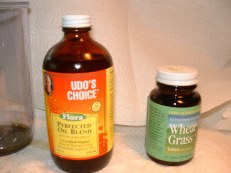
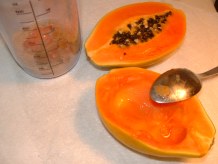 Formula Preparation
Formula PreparationMY formula for my
Hyacinth macaw babies
DRY commercial formula. Follow instructions on bag and mix accordingly
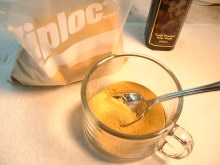 |
macadamia oil
mix lightly
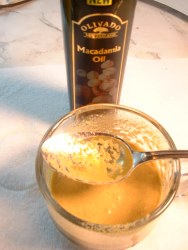 |
add prepared mash. Mix lightly. Add liquid if needed for consistency
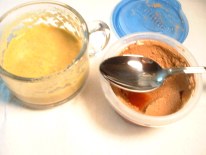 Note: glass cup and sterile tablespoons
|
Care to be given not to dip the spoon from the formula back to the mash. I count out my portion and drop into the commercial formula without the spoon touching. Once the mash is in the formula then I mix both completely.
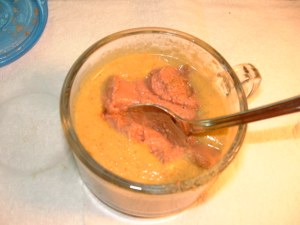 |
 |
 |
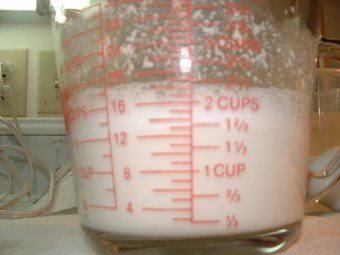
FRESH MACADAMIA MILK MADE HERE AT MY ESTABLISHMENT FOR MY HYACINTH CHICKS
Find a Nutritionist that will guide you with putting together a formula that will suit your chicks and your time.
I choose to make my own although there are many good commercial formula's on the market for Aviculturist to consider.
Study the American Federation of Aviculture (AFA) and AAV http://www.aav.org/Unweaned.htm
stand on this issue at: 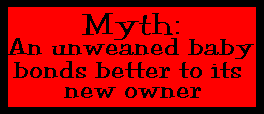

CALIFORNIA CODES
HEALTH AND SAFETY CODE
SECTION 122320-122324
"Baby Parrot Law"
122320. As used in this chapter:
(a) "Bird" means any order of Psittaciformes bird.
(b) "Bird mart" means an event at which two or more persons offer
birds for sale or exchange and where a fee is charged for the
privilege of offering or displaying the birds.
(c) "Hand-feeding" means the process by which a bird is manually
fed by a human through the use of hand, spoon, or oral gavage.
(d) "Pet shop" means a retail pet shop location primarily engaged
in retailing pets, pet foods, and pet supplies, as defined by the
North American Industry Classification System.
(e) "Sale" has the same meaning as retail sale as defined in
Section 6007 of the Revenue and Taxation Code.
(f) "Time of sale" means the calendar date the retail purchaser
removed the bird from the premises of the pet shop following the
retail sale of that bird.
(g) "Unweaned bird" means any bird that requires hand-feeding or
animal assistance to sustain at least 90 percent of its own weight
for at least two weeks.
(h) "Vendor" means any person or entity, including, but not
limited to, a broker, agent, aviary, or breeder, who sells birds
directly to the retail purchaser at a bird mart or at a swap meet as
defined in Section 21661 of the Business and Professions Code.
(i) "Weaned" means a bird that does not require hand-feeding or
animal assistance to sustain at least 90 percent of its own weight
following the time of sale, notwithstanding any illness or injury.
122321. (a) A pet shop with five or fewer employees may not possess
an unweaned bird unless the pet shop employs at least one person per
pet shop location who has completed the Pet Industry Joint Advisory
Council's avian certification program.
(b) A pet shop with six or more employees may not possess an
unweaned bird unless the pet shop employs at least two people who
have completed the Pet Industry Joint Advisory Council's avian
certification program.
(c) A pet shop may not sell a bird unless the bird is weaned.
(d) A vendor may not sell a bird at a swap meet or bird mart,
unless the bird is weaned.
(e) At the time of sale, a pet shop location or vendor shall
document the weight of any hand-fed bird under one year of age, and
note the weight on the sales receipt.
122322. (a) Any person violating any provision of this chapter
shall be subject to a civil penalty of up to one thousand dollars
($1,000) per violation. The action may be prosecuted in the name of
the people of the State of California by the district attorney for
the county where the violation occurred in the appropriate court or
by the city attorney in the city where the violation occurred.
(b) Nothing in this chapter limits or authorizes any act or
omission that violates Section 597 of the Penal Code.
(c) Nothing in this chapter shall authorize the seizure of an
unweaned bird by a peace officer, officer of a humane society, or
officer of a pound or animal regulation department of a public
agency.
122323. This chapter does not apply to publicly operated pounds and
humane societies.
122324. This chapter shall become operative on September 1, 2004.
